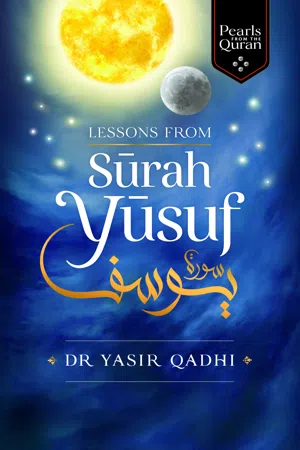
- English
- ePUB (mobile friendly)
- Available on iOS & Android
Lessons from Surah Yusuf
About this book
Surah Yusuf, a chapter of the Qur'an (Koran), was revealed to the Prophet Muhammad at a critical juncture of his life. This was the time when he had gone through ten to eleven years of ridicule and rejection in Makkah, a time when he lost his wife and partner, Khadija, a time when he lost his dear uncle Abu Talib. Allah revealed this precious surah to strengthen the Prophet Muhammad's heart. To remind him that he lives in the footsteps of the great prophets of the past and that Allah's help and support is there.
This surah is full of meaningful messages of patience, reliance on Allah and how to overcome hardship and betrayal. It was also educational, teaching the Prophet Muhammad the answers to queries that were posed to him by the local Jews and Muslims. Finally this surah was a timely morale booster for the Prophet and his companions in a time of need.
Yasir Qadhi has clearly divided the surah into related themes, as per the revelations, so that the reader can easily understand and grasp the great wealth of knowledge relayed through this surah to all.
Information




Table of contents
- Cover
- Title
- Copyright
- Contents
- Transliteration Table
- Foreword
- Introduction
- PART ONE: The The Family of Yaʿqūb
- PART TWO: Sold Into Slavery
- PART THREE: The Seduction
- PART FOUR: The Prisoner
- PART FIVE: The King and His Dream
- PART SIX: From Prisoner to Minister
- PART SEVEN: The Brothers Return
- PART EIGHT: Binyāmīn and the Ruse
- PART NINE: Deprived of Three Sons
- PART TEN: Yūsuf Reveals His Identity
- PART ELEVEN: The Dream Fulfilled
- PART TWELVE: Reminders to the Prophet f
- PART THIRTEEN: 50 Lessons from Sūrah Yūsuf
- Conclusion: The Ring Composition Theory of the Sūrah
- Index
Frequently asked questions
- Essential is ideal for learners and professionals who enjoy exploring a wide range of subjects. Access the Essential Library with 800,000+ trusted titles and best-sellers across business, personal growth, and the humanities. Includes unlimited reading time and Standard Read Aloud voice.
- Complete: Perfect for advanced learners and researchers needing full, unrestricted access. Unlock 1.4M+ books across hundreds of subjects, including academic and specialized titles. The Complete Plan also includes advanced features like Premium Read Aloud and Research Assistant.
Please note we cannot support devices running on iOS 13 and Android 7 or earlier. Learn more about using the app